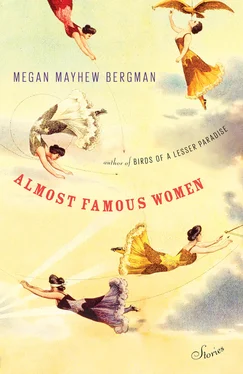We fired the shotgun at Beaufort’s Terrapin Races, presented first place ribbons at hog and collard festivals. We tap-danced with Bob Hope. We crowned Wilson’s tobacco queens, opened for the Bluegrass Boys at various music halls. We knew high-stepping cloggers, competitive eaters, the local strong men. We knew showmanship.
I remember my line from the Terrapin Races: And now, ladies and gentlemen, the tortoise race . Years later, when I woke up in the middle of the night in a hot flash, that line would come to me.
We didn’t know to be unhappy. Violet and I — we didn’t know we were getting robbed blind. We didn’t know about all the money we’d made for Miss Hadley.
I don’t charge you rent, she said at the dinner table. But I should charge for those hungry mouths.
We believed ourselves to be in her debt. We were grateful , even.
Miss Hadley’s yard was overgrown with ivy, honeysuckle, and scuppernong vines. When we hated what she’d made for dinner — she was a terrible cook — we’d go out hunting scuppernongs, eat them fresh off the vine. I liked them best when they looked like small potatoes, soft, golden, and dusty. I had to tug Violet out the front door to eat them. If we came in smelling of fruit, Miss Hadley would come after us with the switches.
Ya’ll been eating scuppanons again, she’d say, catching the backs of our legs. Scuppydines is for poor kids.
We lived in what had been the maid’s room, behind the kitchen. We shared a double bed, slept back-to-back. There was a poster of President Hoover tacked to the wall. Violet papered our drawers with sheet music and hid licorice in her underwear. Miss Hadley had lined the room in carpet samples. I kept a cracker tin full of movie stubs and magazines.
Violet and I lay in bed at night talking about the latest sheet music, or a boy who had come with his parents to see us play at the music hall. We talked about lace socks, traveling to Spain, how we’d one day hear ourselves on the radio, learn to dance beautifully with a partner on each side.
I want to waltz, Violet said.
I want a new dress first, I said. Or to sing “April in Paris” onstage.
Teaching you to walk was some ugly business, Miss Hadley often said. Dancing — I can only imagine. You girls need to work at sitting still, staying pretty. That’s why you’ve learned to read music.
Violet and I — we had thick skin.
We slept with an army of rescued greyhounds, lithe and flea-bitten, in our bed at night. We fed them dinner rolls, put our fingers on their dull teeth, let them keep us warm.

There were no secrets. Imagine: you could say nothing, do nothing, eat nothing, touch nothing, love nothing without the other knowing.

Like King Tut’s death mask, we were exhibited.
The calling card, as I remember it: “If we have interested you, kindly tell your friends to come visit us.” The Pretty, Grown-Together Children .
There were boxes of these in Miss Hadley’s basement, a few scattered across the kitchen table. Stacks in every grocery store and Laundromat in town.
Hear the twins sing “Dream a Little Dream of Me.” Hear the twins recite Lord Byron’s “Fare Thee Well.”
Miss Hadley sat us on a piano bench or leather trunk to play our instruments. We crossed our legs at the ankles. She set out a blue glass vase, which she instructed visitors to deposit money into.
I took in these girls out of the goodness of my heart, she’d say, and I’d appreciate you donating from the goodness of yours so that they can continue their music lessons.
Bless your hearts, the ladies would say, coming up close to inspect us.
Children would ask: Does it hurt? Do you fight? You think about cutting that skin yourself?
It did not hurt to be joined — we knew no difference. As for fighting, yes, but we were masters of compromise: I’ll read books now if you’ll go walking later. You pick the movie this week and I’ll pick next. We can get in bed but I’m going to keep the lamp on so I can read. We can sleep in but you owe me a dollar .
At night, our legs intertwined. This was not like touching someone else’s leg. It wasn’t like touching my own, either. It was comforting, warm. We were, despite our minds’ best efforts, one body.
You kick, Violet told me. You dream violent dreams.
Your arms twitch, I said, though it wasn’t true.
After Miss Hadley’s death, when the movers began emptying her house, our flyers were used to protect the dishes. We were wadded up and stuffed into teacups. Our advertisements scattered across her dry yard. Scuppernongs lay bird-picked and smashed on the lawn. The greyhounds were leashed to the front porch. I could see the sun shining through the translucent skin on their heels. I remember thinking — what now?

When Miss Hadley got the fever we were willed to her cousin Samson like a house. I’m afraid to tell you about the kind of man he was, how our skin got thicker. I’ll tell you this. His house was dark, unpainted, and smelled of pipe smoke. Samson did not shower or shave. He didn’t parade us in public or charge to hear us play music. In fact, the music lessons stopped. He kept us inside. He had other interests.
C’mere, sweetmeats, he used to say, patting his lap.
Ya’lls never been loved properly, he’d say.
There were months when we did not leave the house other than for school and church. It occurred to us to be depressed about our situation, scared. This was the first time we had been truly unhappy.
We were sixteen. One night we packed a bag of our best clothes, her saxophone, my violin. We waited until Samson was good and drunk, then snuck out the back door and caught a bus to New York. We’d never moved so fast together, never been so in sync.
The bag is heavy, Violet said. And my feet hurt in these pumps.
It’s worth every blister, I said. Trust me.
Each step I thought of his breath. Each step I thought of his fingers. The pain went away.
We made it to the station, sweating in our high heels with turned ankles and empty stomachs.
Violet and I swore, in the backseat of that bus to New York, that we’d never mention Samson again. We’d pretend the things he’d done had never happened. The bruises on our thighs would heal and the patches of our hair would grow back. Until then we’d wear hats. We’d practice music on our own. We’d get back into the business.
When we couldn’t pay the bus driver, he dropped us off at the police station. We were freezing. We’d never had a jacket made to fit us.
Put on your lipstick, I said to Violet.
I still like to think of that dime-store lipstick. It was soft and crimson and made me feel beautiful.
Excuse me, I said to a man smoking a cigarette on the cement steps.
He looked up at us in disbelief. He wore a three-piece suit and a tweed cap. His lips were full, and it hurt me to watch him sink his front teeth into his bottom lip.
I could see my breath in the air. The sound of New York was different than the sound of Miss Hadley’s backyard. The street looked wet; there were bricks everywhere, lights lining the sidewalks. We were petrified. I could feel Violet’s blood pressure rising.
I never seen something so pretty and so strange, he said.
And that’s how we got hooked up with Martin Lambert.

Читать дальше













